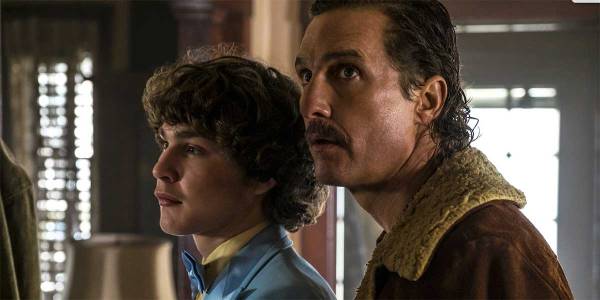J.D. Vance has a story to tell – his own. Many would call it a rags to riches story, or perhaps a successful escape from an impoverished childhood; director Ron Howard and the movie studio went with “inspiring true story” but all of these seem slightly condescending. Vance himself went with “elegy,” a tribute to the place he came from and perhaps a lament to its end.
Older J.D. (Gabriel Basso) has overcome some rather humble beginnings to attend law school at Yale. It’s interview week, especially crucial to him because even with financial aid and 3 jobs he can’t afford next semester’s tuition without a summer internship. Meeting prospective employers over dinner, he’s overwhelmed by the trappings of etiquette and fine dining that seem to come so easily to others. It’s clear he doesn’t feel he belongs, and a phone call from back home only cements it. It’s his sister, Lindsay (Haley Bennett), calling to say that mom Bev (Amy Adams) is in the hospital. Again. A heroin overdose. His help is needed, urgently.
Over the next 24 hours of trying to install Bev in yet another rehab manage a facility despite Bev having let her insurance lapse, J.D. is flooded with difficult memories from his challenging childhood.
Critics have been plenty harsh about Hillbilly Elegy, and I can appreciate their concerns. It delivers heavily on the Oscar bait melodrama, and instead of inspiring important conversations about cultural and economic gaps, it’s got some pretty soft platitudes instead of real insight. Not that a Netflix movie was going to solve the wage gap or cure the generational impacts of trauma.
No one can deny that Glenn Close and Amy Adams give everything to their roles. Close manages a bark that bites, with just a nibble of vulnerability, a terrific performance that just doesn’t have anywhere to go, there’s no arc, it’s mostly just an act of observation. Amy Adams’ character, on the other hand, is more like a series of attacks. She gnarls and gnashes her teeth and we get small glimpses or what triggers her explosions, but it’s not enough to piece together something truly satisfying. The characters lack insight and we can only guess that this cycle will be very hard to break.



 has never known him. Philip and his father are always clashing, and Philip can’t wait to get far, far away from his family when he goes to NYU next year. But for now he’s trapped in his father’s house, living by the rules that Frank isn’t even there to enforce. So when Frank flies to Japan on business, Philip thinks it’s the perfect opportunity to go blow off some spring break steam. But what he finds there is not what he bargained for: it’s his dad…and his dad’s second family. Oh, fudge.
has never known him. Philip and his father are always clashing, and Philip can’t wait to get far, far away from his family when he goes to NYU next year. But for now he’s trapped in his father’s house, living by the rules that Frank isn’t even there to enforce. So when Frank flies to Japan on business, Philip thinks it’s the perfect opportunity to go blow off some spring break steam. But what he finds there is not what he bargained for: it’s his dad…and his dad’s second family. Oh, fudge.